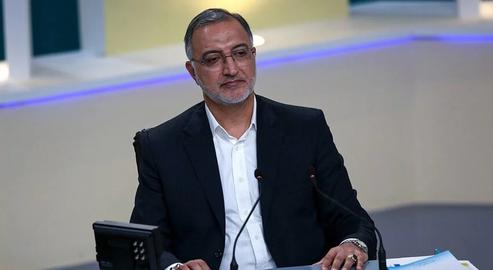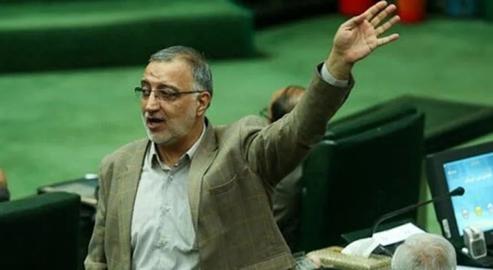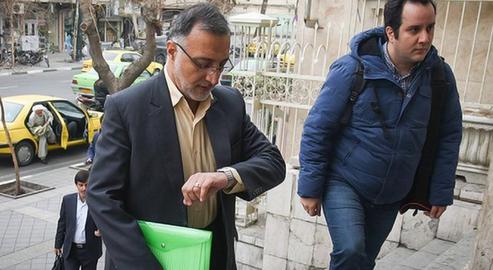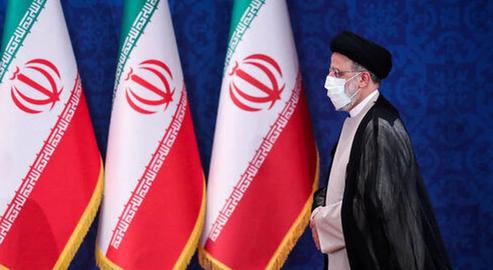Alireza Zakani was elected mayor of Tehran on Sunday, August 8 after winning 18 votes from the 21-member city council.
It came hot on the heels of his recent, provocative move to stand as an effective “cover candidate” for Ebrahim Raisi during the 2021 presidential election campaign. Apart from enabling Raisi in the debates, Zakani’s standing helped to knock Ali Larijani, who would perhaps have been Raisi’s only serious political contender, off the list of Guardian Council-approved candidates.
His queasy ascendance to the mayoralty of Tehran was marked by allegations of threats made to councillors and a lack of qualifications. It comes off the back of a career defined mostly by back-biting, low-level financial scandal - and a first-of-its-kind slander trial.
The Pot-Stirring MP
During the Iran-Iraq war in the 1980s, the Iranian officers tasked with disabling mines were known as “destroyers”. Since then, among the supporters of Supreme Leader Ali Khamenei, there has always been a dedicated taskforce of political “destroyers” there to neutralize any potential political opponents. Alireza Zakani has always been one of them.
Zakani owes his political career to his activities in the Student Basij Organization after the Iran-Iraq war. His appointment as commander of this organization, first in Tehran and then at the national level, coincided with the presidency of the reformist Mohammad Khatami and major incidents of repression of student activism, most notably the state-sponsored attack on a student dormitory in Tehran.
He was elected as an MP in the seventh parliament of the Islamic Republic in 2004, and held the post for three further terms. One of his more divisive acts in the legislature was his barrage of lengthy attacks on Abdollah Jafar Ali Jassbi, the president of Islamic Azad University, long before other principalists had launched a campaign to take over the institution.
From that point in time, it became clear that Zakani was one the “destroyers” of Khamenei’s circle. He went on to regularly castigate members of the reformist camp as well as former President Ali Akbar Hashemi Rafsanjani.
In 2008, Zakani co-founded the principalist Society of Path-Seekers of the Islamic Revolution along with conservative MP Mohammad Dehghan, cleric and IRGC official Mehdi Taeb and Faridodin Haddad-Adel, an in-law of the Supreme Leader. He served as the bloc’s secretary-general for three terms.
In the eighth parliament he also spoke against several members of President Ahmadinejad’s cabinet, including Hamid Behbahani, then-Minister of Roads and Transportation. His choices of language during Behbahani’s confirmation hearings drew criticism, to the point that he was publicly admonished by then-Speaker of Parliament Ali Larijani.
During this period, Zakani was broadly aligned with the fundamentalist Front of Islamic Revolution Stability. But he sometimes clashed with its members. In the course of one such argument in 2012, conservative MP Ruhollah Hosseinian pointed out that Zakani was often absent from parliament because he was “continuing his education” – and making extra cash working for an array of magazines and websites.
Zakani stood as a candidate in the 2013 presidential election. But the Guardian Council disqualified him, presumably because at that time Khamenei and his followers did not see any benefit to his candidacy.
In the ninth parliament of the Islamic Republic, from 2012 to 2016, he then served as chair of the parliament’s JCPOA Committee. He was supposed to remain neutral but despite trying to present as an unbiased actor, he eventually came out against the nuclear deal.
In recent years Zakani has been eager to bring up corruption cases as a means of political point-scorng. He has achieved this in coordination with both the Revolutionary Guards’ Intelligence Unit and Hossein Fadaei, head of the inspection bureau at the Supreme Leader’s office. He repeatedly attacked Hossein Fereydoon, Hassan Rouhani’s brother, who was sentenced to five years in prison for bribery and corruption.
In the election for the 11th parliament in 2020, Iran’s principalists could not agree on a list of candidates for Tehran. Zakani re-entered parliament as an MP for Qom instead. His utter ignorance of the needs and situation of the province, especially its deprived zones, were soon exposed in Iranian media. Nevertheless Zakani was considered a choice for the speakership of the parliament for that term. In the end, he had to do with presidency of the Parliamentary Research Center.
Then when the 11th parliament opened, Zakani was among an outspoken group of MPs who sought to tarnish the credentials of the reformist Gholamreza Tajgardoon, who had been elected in Kohgiluyeh and Boyer-Ahmad province. In a bid to discredit him, Zakani told lawmakers: “Tajgardoon’s second wife and their daughter live abroad”.
He also claimed Tajgardoon had failed to add their names to his ID card - implying that he had two sets of ID documents, which, of course, is illegal. In response, Tajgardoon said: “Perhaps I’m a dirty window, but your dishrag isn’t fit to clean me.” In the end it was Zakani and his cronies who had the last word and the parliament did reject Tajgardoon’s credentials.
Zakani has kept his hand in since then, managing last October to become the first ever Iranian tried by a jury on the "political" charge of "spreading lies" in relation to comments he had made about the Intelligence Ministry. Unlike thousands of good-faith journalists, activists and ordinary Iranians before him who never had this privilege, he was unanimously acquitted.
Corruption Charges Against the “Corruption Fighter”
Despite trying to paint himself as an anti-corruption zealot, Zakani has been embroiled in his fair share of financial shenanigans: the financing of a company owned by his daughter and her spouse, the financing of his daughter’s education in Switzerland, and his 500-million toman (US$121,000) contract with the Islamic Development Organization. Zakani and a group of allies also registered two charities whose addresses were the same as that of the Society of Path-Seekers.
Alireza Zakani is married to Masoumeh Pakatchi, who has a seminary education and for many years was the director of Tehran province’s seminary for women. Since 2007 she has been the director of the women’s division of Imam Mehdi Cultural Foundation.
Zakani has said that, before marrying his wife, he had wanted to marry an Iran-Iraq “war widow”. But the unnamed woman apparently rejected his offer, telling him, in his narration: “If we marry you might get killed as well, and I can’t take it again.”
An Uncomfortable Start to Mayoralty
Zakani’s “election” as mayor of Tehran came under a cloud. In the run-up to the vote Mehdi Chamran, the chairman of Tehran City Council, said members of the council had received threats pushing them to vote for Zakani (Chamran was apparently unaware his microphone was still on when he said this to Narges Soleimani, daughter of General Ghasem Soleimani, who managed to secure a place on the council despite a lack of political credentials).
In fact, Zakani didn’t even have all the required qualifications to become mayor of Tehran. But this, it transpires, can be easily circumvented: council deputy chairman Parviz Sorouri, has announced the regulations will be amended so that Zakani makes the grade.
visit the accountability section
In this section of Iran Wire, you can contact the officials and launch your campaign for various problems



























comments